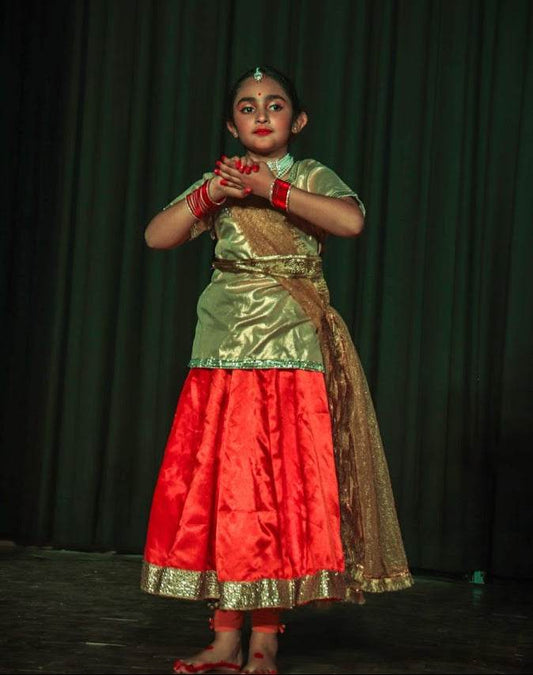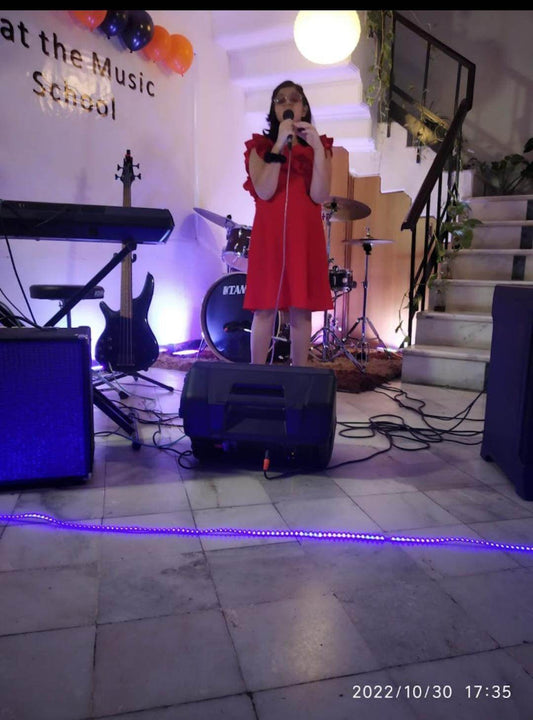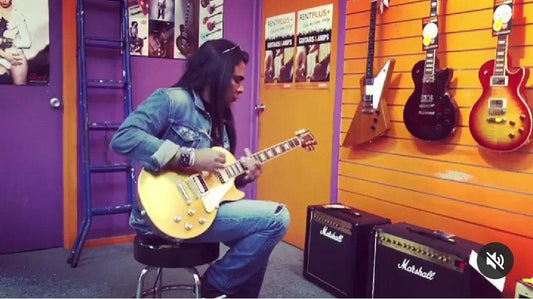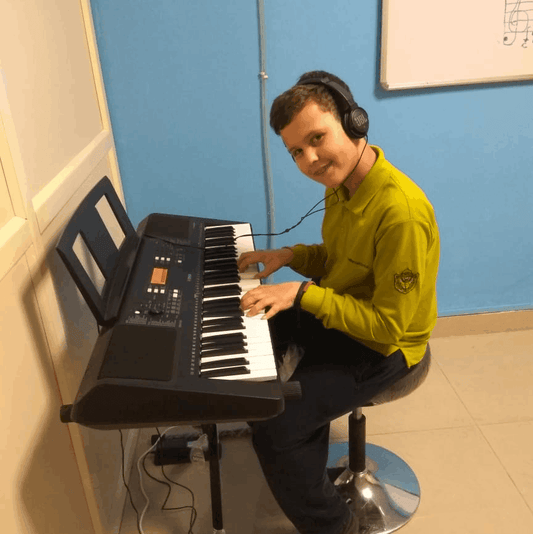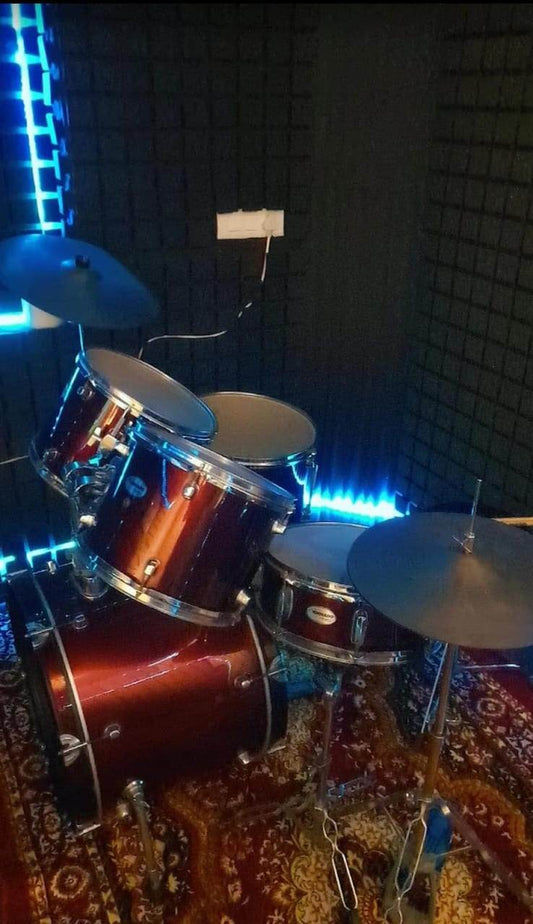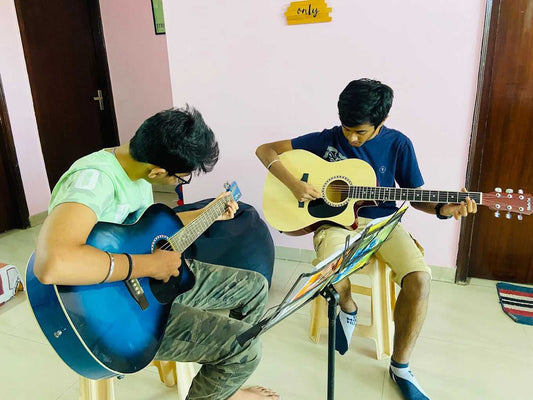-
A One Music Academy for Kathak Keyboard & Dance | Sector 46 Gurgaon
Regular price From ₹7,500Sale price From ₹7,500 Regular priceUnit price per -
A One Music Academy for Dance Keyboard Guitar Classes Sector 56 Gurgaon
Regular price From ₹6,999Sale price From ₹6,999 Regular priceUnit price per₹7,500Deal -
Pt. Bhimsen Joshi Sangeet Academy for Music Dance Art & Craft | South City 2 Gurgaon
Regular price From ₹9,000Sale price From ₹9,000 Regular priceUnit price per -
Beat the Music School for Western Vocals | Sushant Lok Phase 1 Gurgaon
Regular price From ₹3,500Sale price From ₹3,500 Regular priceUnit price per -
MJ Masterclasses for Western Music Vocals Guitar | Sector 56 Gurgoan
Regular price From ₹4,000Sale price From ₹4,000 Regular priceUnit price per -
Music Soul Academy for Guitar Ukulele Piano Vocals | DLF Phase 5 Gurgaon
Regular price From ₹2,500Sale price From ₹2,500 Regular priceUnit price per -
Aavaaz School Of Music for Vocal & Instrumental Classes | Palam Vihar Gurgaon
Regular price From ₹2,000Sale price From ₹2,000 Regular priceUnit price per -
Dom Music Academy for Drums Guitar Keyboard | Sector 52 Gurgaon
Regular price From ₹4,000Sale price From ₹4,000 Regular priceUnit price per
About Western Vocal Music Classes in Gurugram
Western Music Classes: Unlock Your Musical Potential
Western music encompasses a wide range of musical styles and traditions, from classical compositions to contemporary genres like rock, jazz, and pop. Whether you're interested in learning to play an instrument, develop your vocal skills, or understand music theory, Western music classes provide the foundation and expertise to help you excel in your musical journey.
What Are Western Music Classes?
Western music classes are educational courses designed to teach various aspects of Western music, including music theory, instrumental training, vocal techniques, composition, and music history. These classes may cover different genres such as classical, jazz, pop, rock, blues, and electronic music. Western music classes typically include lessons on understanding musical notation, rhythm, harmony, melody, and performance skills.
Types of Western Music Classes
Western music classes can be categorized based on the musical instruments, genres, or skills they focus on. Some popular types of Western music classes include:
1. Classical Music Classes
Classical Western music is a foundation for many modern music genres. It includes the study of classical composers like Mozart, Beethoven, and Bach, and is often taught through both instrumental and vocal training.
- Instrumental Training: Classical music classes typically involve learning instruments such as the piano, violin, cello, guitar, and woodwinds.
- Vocal Training: Classical vocal music classes focus on opera, art songs, and choral music. Students learn techniques to improve pitch, tone, and breath control while performing classical repertoire.
2. Contemporary Music Classes
These classes focus on modern genres of Western music, such as pop, rock, jazz, blues, and R&B.
- Pop and Rock Music: Students learn how to play popular songs on instruments like the guitar, drums, and keyboard, and develop skills in singing popular music styles.
- Jazz Music: Jazz classes teach improvisation, swing rhythms, and harmony, with a focus on musical creativity and playing in an ensemble.
- Blues and R&B: Classes in these genres focus on learning guitar or piano techniques specific to blues and rhythm sections, along with an understanding of soulful vocal delivery.
3. Music Theory Classes
Music theory is the study of the language of music, and it forms the foundation for understanding all aspects of music. Theory classes teach the fundamentals of scales, chords, intervals, rhythms, and harmony.
- Sight-Reading and Notation: Learning to read music and understand musical symbols is a critical aspect of music theory.
- Harmony and Chord Progressions: Advanced music theory classes may delve into complex chord structures, modulations, and compositional techniques.
4. Music Production and Composition Classes
These classes focus on the creation of music, including songwriting, arranging, and digital music production.
- Songwriting: Students learn how to write melodies, lyrics, and harmonies, developing their creative process.
- Music Production: This involves learning to produce music using software like Ableton Live, Logic Pro, and Pro Tools. Students also learn about mixing, mastering, and recording techniques.
5. Vocal Training Classes
Western vocal music focuses on various singing techniques that cater to different styles, including classical, opera, and contemporary music.
- Opera Singing: These classes emphasize the development of the operatic voice, learning how to project and sing long phrases.
- Contemporary Singing: Includes popular music styles like pop, jazz, and rock. It teaches techniques for breath control, vocal agility, and performance.
6. Instrumental Music Classes
These classes focus on learning specific Western instruments and their techniques.
- Piano/Keyboard: Learn to play the piano, including classical pieces, contemporary songs, and improvisational techniques.
- Guitar/Bass Guitar: From classical guitar techniques to electric guitar soloing, students can explore various genres, including rock, blues, and jazz.
- Drums/Percussion: Drumming classes focus on rhythm, timing, and drum set techniques, including learning different styles like rock, jazz, or Latin rhythms.
- Wind and String Instruments: Learn instruments such as the violin, flute, trumpet, or saxophone, with classes focusing on classical music, orchestral playing, and solo performance.
Benefits of Western Music Classes
Enrolling in Western music classes offers a range of benefits, including:
1. Improved Musical Skill Development Western music classes teach fundamental skills in playing instruments or singing, allowing students to improve their technique, timing, and overall musical proficiency.
2. Expanded Musical Knowledge Learning music theory and different musical genres helps expand your understanding of music as an art form. You’ll develop a deeper appreciation for classical music, jazz improvisation, or modern popular music.
3. Enhanced Creativity Music encourages creativity and innovation. Whether you’re composing original music or improvising on an instrument, Western music classes foster the creative process and allow you to express your individuality through sound.
4. Discipline and Focus Learning music requires dedication and consistent practice. Music students develop discipline, focus, and patience, which can be applied to other areas of life.
5. Performance Opportunities Many Western music classes offer performance opportunities, whether in recitals, concerts, or group ensembles. These events give students a chance to showcase their talents, build confidence, and connect with other musicians.
6. Stress Relief and Emotional Well-being Playing or singing music is a great way to relax and express emotions. Many people find that music serves as an outlet for stress and helps improve overall mental health and well-being.
What to Expect in Western Music Classes
When you join Western music classes, you can expect structured lessons with a focus on both technique and artistic expression. Here’s what you can typically expect:
1. Personalized Instruction In most Western music classes, instructors provide personalized feedback to help you improve your skills. Teachers may work one-on-one with you or in small groups to ensure that you receive tailored guidance suited to your level and style.
2. Warm-Up Exercises Every music class will likely begin with warm-up exercises. Whether it's vocal warm-ups or scale practice for an instrument, these exercises help prepare your body and mind for the lesson.
3. Progress Tracking Teachers monitor your progress and provide constructive feedback on areas to improve. This can include lessons on musical expression, dynamics, and technical accuracy.
4. Group or Solo Performance Many music classes incorporate performance elements. You may be asked to perform a piece solo or with an ensemble, providing an opportunity to practice your skills and perform in front of others.
5. Exposure to Different Genres Instructors often introduce you to a variety of musical genres and styles, from classical to contemporary, to ensure that you develop a well-rounded understanding of Western music.
Choosing the Right Western Music Class
When selecting a Western music class, consider the following factors:
1. Class Type Choose a class that matches your musical interests. Whether it’s learning an instrument, studying music theory, or taking vocal lessons, select the class that aligns with your goals.
2. Instructor Expertise Look for experienced and knowledgeable instructors who are skilled in the genre or instrument you wish to learn. A good instructor will not only teach you techniques but also inspire you to be creative and passionate about music.
3. Class Size Smaller class sizes offer more one-on-one attention from instructors, while larger classes may offer group performance opportunities. Consider what works best for your learning style.
4. Schedule and Location Find a class that fits your schedule. Many music schools offer evening or weekend classes to accommodate students’ availability.
5. Trial Classes Many music schools offer trial classes or introductory lessons. Attend a few trial classes to determine if the teaching style and class structure align with your learning preferences.
Western music classes provide valuable learning experiences for individuals interested in mastering various instruments, developing vocal skills, or gaining a deeper understanding of music theory and composition. Whether you want to become a classical pianist, jazz singer, or rock guitarist, these classes will help you build the skills, creativity, and confidence needed to succeed in your musical journey. By dedicating time to learning Western music, you open the door to endless possibilities for self-expression, performance, and artistic growth.


